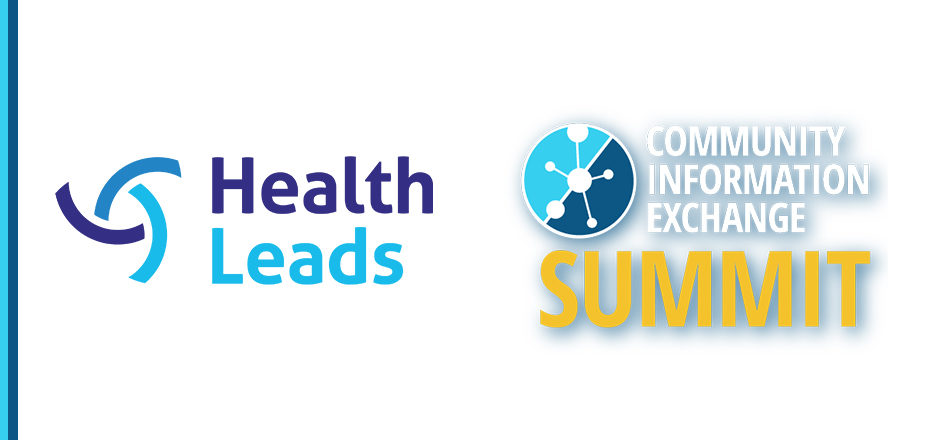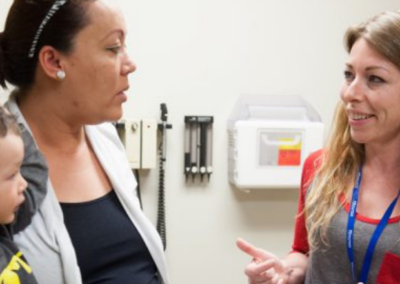Community Information Exchange Summit 2021: Leading with Community to Drive Systems Change

Health Leads was a proud co-collaborator at this year’s virtual Community Information Exchange Summit, a national conference hosted by 211 San Diego that bridges health and social service sectors to build strong and thriving communities. This year, Health Leads led and participated in discussions on intentionally centering community voice, equity, and anti-racism principles in multi-sector data sharing models. Learn more by checking out the Health Leads breakout sessions below!
Session 1: Community Engagement in Technology, Privacy and Data Governance Design
Session 2: Beyond Do No Harm: Principles in Technology
Session 3: Changing Course: Shifting to Multi-Sector Models
Session 4: The Changing Role of Community in SDOH Investments
Community Engagement in Technology, Privacy and Data Governance Design
Data governance emphasizes the importance of communities owning the very information that comes from them, and then leverage data to make decisions about their everyday lives. This session is grounded at the rich intersection of community engagement and data governance. What does it look like for data infrastructures and technologies to be designed in a way that responds to the concerns and enables the hopes of communities most deeply impacted by these networks? The reality of equitable data governance means attending to lessons learned on the ground and asking specific questions. What are some processes that have supported early design of data sharing policies? How have community members guided the design of governance structures and defined key principles in data sharing practices?
In this session, individuals representing a variety of roles and perspectives in the Community Information Exchange in King County, Washington will share how they contributed to the design of their data governance structures and policies. Attendees will also learn the important role community engagement plays in defining data standards and building infrastructures.
Panelists
- Sara Standish, Associate Director, Community Information Exchange, HealthierHere
- Sully Moreno, Community Engagement Manager, CIE, HealthierHere
- Modester (Mo) Chatta, Board Member, Association for Zambians In Seattle Washington
- Jessica Juarez-Wagner, Development Director, United Indians of All Tribes Foundation
Moderator
- Sheena Nahm McKinlay, PhD, MPH, VP of Research & Development, Health Leads
Beyond Do No Harm: Principles in Technology
Many stakeholders of power and influence, like health care systems, government, and funders, see technology as an integral and standard part of social care interventions. As a result, we now see a proliferation of technology focused on social determinants of health in the health care market. Despite social care coordination platforms being useful tools, the market domination approach of many technology vendors, enabled by stakeholders of influence, has perpetuated unintentional harm and exploitation of community members and community-based organizations (CBOs). CBO marginalization, trickle down community engagement, and misaligned community implementation are just a few unintended harms and byproducts of these tech-forward SDOH implementations and evaluations.
In this session, three panelists will share their perspectives on how social care platforms have been presented within the sector; shortcomings of these platforms regarding equity and anti-racism; opportunities for a shift in the market domination approach of social care technology; and the role community plays in holding technology accountable to community, equity, and anti-racism.
Panelists
- Rey Faustino, Chief Impact and Strategy Officer, Alluma
- Ngozi Moses, MSc, Executive Director, Brooklyn Perinatal Network
- Sonia Sarkar, Director of Social Homes and Health Equity, P3 Lab; Leadership Team, Shift Health Accelerator
Moderator
- Artair Rogers, Director of Programs, California, Health Leads
Changing Course: Shifting to Multi-Sector Models
Many organizations have made anti-racist statements and commitments to address the racial inequities within their communities. Because racial inequities exist in every aspect of social structure, a truly anti-racist approach must include multi-sector models that capture diverse ways of defining outcomes. Meaningful collaborative action must also genuinely and authentically center the community members who are most impacted by all of these systems. This calls for processes and principles in new multi-sector models to include ways of ceding power and respecting expertise that lives outside of institutions.
In this session, two communities will share their journey toward community-led multi-sector models of care coordination. Presenters will share the challenges, successes and lessons learned trying to make their communities a more equitable and healthier place.
Panelists
- Jenn Valenzuela, Chief People and Equity Officer, Health Leads
- Ricardo Henry, Community Coordinator, Neighborhood Food Action Collaborative
- Emily Q. Chung, MPH, MCHES, Public Health Manager and Whole Person Care Program Director, County of Santa Cruz Health Services Agency (HSA)
Moderator
- Artrese Morrison, Director of Program, Bay Area, Health Leads
The Changing Role of Community in SDOH Investments
The COVID-19 pandemic further exposed health inequities and the structural racism that is embedded in society, leading to an increase in investment of social determinants of health (SDOH) programs, interventions and technology. This has presented an opportunity for organizations to rethink their strategies to better align with the health and social issues that contribute to local inequities. The term, ‘community engagement’ has been an increasingly used buzzword heard across sectors, and a core area of investment both inside and across organizations. But what is ‘community engagement’? This renewed emphasis on the centrality of communities is important for the future of healthcare and public health, and calls for a shared understanding of the actual meaning of ‘community engagement.’
In this session, panelists will discuss the changing role of community within SDOH programs focusing on what we need to reconsider when we think about program design and funding mechanisms to address SDOH and achieve health equity. Panelists will highlight their experiences, strategies and on the ground lessons learned centering the community, assessing investments and redefining the definition of a good investment.
Panelists
- Lauren Taylor, Assistant Professor of Health Policy and Management, NYU
- Jenn Kons, Director of Community Investment, United Way of Greater Cleveland
- Jennifer Powell, System Director – Community Impact and Operations, CommonSpirit Health
Moderator
- Julie Wang, Director of Innovative Partnerships, Health Leads




